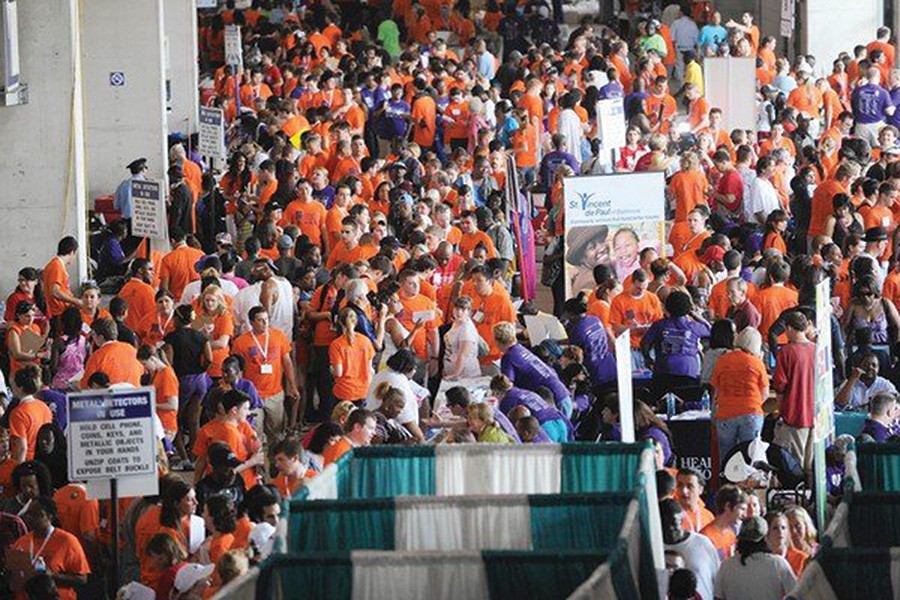What a difference a day can make.
Johns Hopkins students, staff, and faculty—and hundreds of other volunteers from the region—came together at the Baltimore Convention Center on Oct. 2 for Project Homeless Connect, a daylong resource fair designed to provide homeless people in the community with the services and tools they need to overcome their challenges.
Starting early in the morning, participants arrived by the hundreds to get a haircut, dental care, Social Security card, state photo ID, and other items and services that many of us take for granted.
Project Homeless Connect is a service offered by the United Way of Central Maryland, which for decades Johns Hopkins University has directly supported through its United Way campaign. The JHU campaign, which this year launched Oct. 1 and runs until Dec. 12, consists of various events and activities to raise awareness of local agencies and efforts that help people get out of crisis, stabilize, and achieve self-sufficiency.
Project Homeless Connect was brought to Baltimore in 2012 as part of a national model that emerged in San Francisco in the early 2000s. Its major sponsors this year were United Way of Central Maryland, Journey Home, Exelon, and the Mayor's Office of Human Services.
Scott Gottbreht, a Johns Hopkins graduate student and program manager for Project Homeless Connect, took on a leadership role in the program's inception here.
"The first year was such a success that Baltimore has continued the event, and it has only been gaining strength ever since," says Gottbreht, a student in the Krieger School's Humanities Center whose doctoral dissertation focuses on the portrayal of homelessness during the housing crisis. "We leveraged Hopkins' spirit of volunteerism in order to create university and community partnerships that enabled the event to come to fruition."
This year, nearly 2,400 volunteers were on hand for a program that has been named by United Way Worldwide as a national best practice model.
The 175 volunteers from Johns Hopkins—many of them recruited by students in the university's Center for Social Concern, or CSC—included undergraduates, graduate students, staff, and faculty. School of Medicine students served as liaisons to determine participants' medical needs and priorities and offer strategies to take care of them. The Carey Business School led the employment and education area during the planning and orchestration of the event. JHU undergrads worked on the project for the entire summer under the auspices of the CSC's Community Impact Internship Program. SOURCE (Student Outreach Resource Center) at JHMI participated in volunteer recruitment. The Johns Hopkins Women, Infants and Children Program, the Johns Hopkins Community Health Partnership, and the JHU Center for AIDS Research all provided direct services.
"Most resource fairs will leave participants with a stack of papers and phone numbers for them to call at a later time," Gottbreht says. "Project Homeless Connect focuses on on-site services so that participants can go to a dentist or doctor and leave with medicine right away. They can fill out a resume and talk to an employer, get groceries and other direct services right on the spot."
Participants were matched with guides to walk them through the fair and connect them with services that could help start to knock down the barriers keeping them from self-sufficiency. Nearly 2,000 people were helped.
Project Homeless Connect is one of the many ways that Johns Hopkins is committed to improving Baltimore communities, says Kathleen Crostic, community programs manager for the Johns Hopkins Office of Work, Life and Engagement and the liaison between United Way of Central Maryland and the university.
Last year, the JHU and JHM campaigns collectively raised $2,291,346. The university's goal for this year is $525,000, which Crostic is confident will be met and likely exceeded. The goal for the recently completed JHM campaign was $1.66 million. David Andrews, dean of the School of Education, is chair of the university's campaign. Charlie Reuland, executive vice president and chief operating officer of Bayview Medical Center, chairs the JHM campaign, which ran from Oct. 14 to Nov. 1.
As in past years, employees can designate all or part of their donation to the Johns Hopkins Neighborhood Fund, which supports agencies that serve communities in close proximity to Johns Hopkins campuses and have a strong relationship with Johns Hopkins and its employees.
"United Way is one of the many ways for employees to give back, and our neighbors get to see that Johns Hopkins is really connected and committed to our communities," Crostic says.
Donations can be made online at https://login.johnshopkins.edu/unitedway or by filling out a paper pledge form in the Office of Work, Life and Engagement.
Posted in University News
Tagged united way








